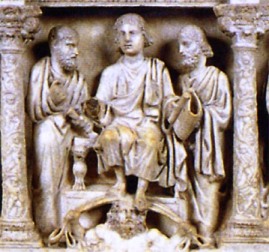Today’s Collect in the Ordinary Form was not in the 1962 or previous editions of the Missale Romanum. However, the Gelasianum Vetus provides a predecessor of this prayer.
Clementiam tuam, Domine, supplici voto deposcimus,
ut nos famulos tuos, paenitentia emendatos
et bonis operibus eruditos,
in mandatis tuis facias perseverare sinceros,
et ad paschalia festa pervenire illaesos.
How about that chain of accusatives? “emendatos… eruditos… sinceros… illaesos.” The whole thing is a little gem of tropes and sounds and parallels.
Let’s move along to what the prayer really says.
LITERAL TRANSLATION
O Lord we are beseeching Your mercy with this humble prayer,
that you cause us, Your servants,
corrected by means of penance
and polished by means of good works,
to persevere genuine in Your commands,
and to attain unscathed to the paschal celebrations.
We should remind ourselves of certain recurring questions when reviewing these ancient prayers. Again we have the possibility that clementia tua would have rung in the ears of our ancient forebears as a title, “Your Clemency”. This title points also to a divine characteristic, at least from our miserable point of view. God is merciful and kind. The words supplex, votum, deposco suggest a very lowly attitude on our part.
The overarching image is that of God as Teacher, I think. The prayer is addressed to God the Father, through Christ (Per Dominum…etc.). Yet Christ as Teacher is a common image in early Christian art. Our vocabulary also suggests this; we are corrected (emendati) and polished/instructed (eruditi).
This is a finely crafted prayer, beautifully balanced and intricate. Look at that chain of accusatives stretching through the prayer: (nos & tuos) famulos … emendatos… eruditos… sinceros… illaesos. These are all descriptions of what God has made us and will continue to make us through His mercy. Another series threads through the prayer in the ablative: paenitentia… bonis operibus… mandatis. These are the means by which God made us into the accusatives. Note also the chiastic parallel in the structure. Correction and penance connect best with perseverance and commands, which polishing and good works connect best with being attainment and soundness. A logical sequence is found as well. First, we see what we are by means of something (corrected/instructed) and then what we are for something (genuine/unscathed).
Christ is the perfect model of all that is mentioned in the prayer. He is the perfect exemplar.
St. Augustine, in his monumental City of God is a little cautious about presenting the Lord as being our model and exemplar. He knows that Christ, the perfect model, presents for us an unattainable challenge. For Augustine, the lives of the martyrs and other holy men and women are more helpful and realistic models. In their fully be merely human lives they show us that we fully human but merely human people can live the life to which Christ’s commands and perfect model calls us.
 In looking at this prayer, I got the fleeting impression of the figure of David. David is the focus of much attention on the part St. Ambrose. Perhaps digging into Ambrose on David and some of the vocabulary might produce interesting results.
In looking at this prayer, I got the fleeting impression of the figure of David. David is the focus of much attention on the part St. Ambrose. Perhaps digging into Ambrose on David and some of the vocabulary might produce interesting results.
Also, there comes to mind the ancient way of producing written texts.
In rhetorical training orators were taught to approach topics in stages.
They would find the questions and points of interest (inventio) and then arrange things properly (dispositio) and come to a proper way to deliver the concepts (elocutio). There is a whole raft other terms applicable to this process.
In our prayer today we see something of the same process in penance, requiring introspection and examination, the proper application of things especially though the guidance of divine commands and teaching, and finally the outward expression of the proper content through fulfillment of God’s commands and the festive joy that we attain.
Also, in writing out texts, there would be a process of drafting and correction (emendatio or castigatio, words we have seen in the prayers for Lent) and also the polishing of the text, sometimes even literally.
To prepare a sheet of vellum or a scroll, it needed to be polished, mistakes were scraped off and the site repolished.
We are works in progress. God’s works. God writes his law into our being as His images. The Father through the Holy Spirit writes His Word upon our hearts.
In this last phase of Lent let us ask Mary, the great Mother of God who is Mother of the Church and Queen of Martyrs, to accompany us in a special way by her intercession, that we may persevere in our resolve to be conformed to all that Christ and Holy Church enjoins on us.


































